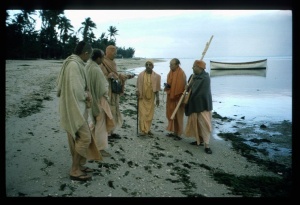CC Antya 4.179

A.C. Bhaktivedanta Swami Prabhupada
TEXT 179
- āmi ta’—sannyāsī, āmāra ‘sama-dṛṣṭi’ dharma
- candana-paṅkete āmāra jñāna haya ‘sama’
SYNONYMS
āmi — I; ta’ — certainly; sannyāsī — in the renounced order of life; āmāra — My; sama-dṛṣṭi — seeing everything on the same platform; dharma — duty; candana-paṅkete — between sandalwood pulp and mud; āmāra — My; jñāna — knowledge; haya — is; sama — same.
TRANSLATION
“Since I am in the renounced order, My duty is to make no distinctions and be equipoised. My knowledge must be equally disposed toward sandalwood pulp and dirty mud.
PURPORT
It is the duty of a sannyāsī, a person in the renounced order, to be always equipoised, and that is also the duty of a learned man and a Vaiṣṇava. A Vaiṣṇava, a sannyāsī or a learned person has no conception of the material world; in other words, he has no conception of anything materially important. He has no desire to use sandalwood pulp for sense gratification, nor does sense gratification make him hate mud. Acceptance or rejection of material things is not the concern of a sannyāsī, a Vaiṣṇava or a learned person. An advanced devotee has no desire to enjoy or reject anything. His only duty is to accept whatever is favorable for the advancement of Kṛṣṇa consciousness. A Vaiṣṇava should be indifferent to material enjoyment and renunciation and should always hanker for the spiritual life of rendering service to the Lord.